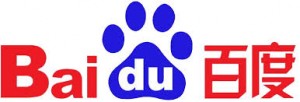INTERNET: Investors Unimpressed by Baidu Cars, Take-Out Dining
Bottom line: A Baidu downgrade by Deutsche Bank and new developments in its takeout dining and driverless car businesses highlight its heavy reliance on its search business and costly diversification attempts with no immediate profit potential.

A trio of headlines are spotlighting the difficulties faced by Chinese Internet giant Baidu (Nasdaq: BIDU) as it tries desperately to diversify beyond its core online search business. At the center of this news flurry is a downgrade of Baidu’s stock by Deutsche Bank, which looks mostly related to the company’s big revenue decline after a scandal earlier this year. But the other 2 headlines, one about Baidu’s driverless car initiative and the other about its online take-out dining service, both nicely highlight the huge money that Baidu is spending on its new businesses, nearly all of them losing big money.
One of those other headlines says that yuppie lifestyle brand Starbucks (Nasdaq: SBUX) will soon start to offer its products via take-out delivery service, and that one of its first partners in that initiative will be Baidu. The other says that Baidu has poached a former top executive from BAIC Motor (HKEx: 1958), one of China’s leading car makers, to join its driverless car initiative.
Baidu’s current conundrum is nicely summarized by its stock price, which has gyrated wildly over the last 2 years as investors try to decide whether they like the company. The stock fell as much as 20 percent this spring, after a scandal that created outrage over the company’s longtime practice of mixing paid and organic search results without clearly telling web users. That scandal forced it to become more transparent and cut back on its overall advertisements per page, wiping about 10-15 percent from its revenue.
The downgrade from Deutsche Bank looks mostly related to that setback, with the US brokerage changing its rating on Baidu to “hold” from a previous “buy”. (Chinese article) Deutsche also lowered its price target for Baidu to $201 from a previous $219, versus a current price of about $182, and notes that the company will take a while to recover from the scandal. Baidu’s shares fell 3 percent in the latest trading session after the report came out, though they are still well above their lows after the scandal earlier this year.
Baidu relies on search for nearly all of its profits and a similarly large part of its revenue, and the hit it took from the scandal highlights that vulnerability. The company has been trying to diversify to address that weakness, but most of its new businesses have simply become black holes devouring profits from its core search unit.
One of the company’s most aggressive initiatives has been in take-out dining, where Baidu competes with names like Meituan and Ele.me for a business that lets consumers order food over the Internet for delivery to their homes. That business has seen not only cutthroat competition, but also its own share of scandals due to the presence of many unlicensed restaurants participating in various services.
Starbucks Jumping on Baidu Bikes?
Now Starbucks may be getting set to add its name to the long list of eateries that offer their products over the take-out dining services, and has approached Baidu about being a partner, according to a Chinese media report. (Chinese article) The report says that Starbucks has put all the systems into place for such a service, which will allow customers to receive their take-out deliveries within 20 minutes of placing an order.
The report points out that many of China’s take-out dining platforms already offer Starbucks products through various third-party agents, though none works directly with the coffee giant. A service directly offered by Starbucks does seem filled with potential, since many Chinese already buy coffee at the stores for take-out to their homes and offices. Thus this kind of service would save them some trouble, and Baidu could win lots of new business if it becomes a partner, even if that business just adds to its losses.
Finally there’s the driverless car news, which will see an executive named Wu Xuebin join Baidu as a vice president of its unit. (English article) Wu was previously at BAIC, but his experience in the car industry also includes stints at General Motors (NYSE: GM), Ford (NYSE: F) and Porsche.
It’s not really clear if Wu has any experience with driverless cars, since it’s such a new area and BAIC wasn’t particularly active in the space. Baidu was one of China’s earliest companies to jump into the space, but more recent arrivals also include gaming leader Tencent (HKEx: 700) and online video giant LeEco (Shenzhen: 300104). This latest hire shows Baidu is still pushing ahead seriously in the space, meaning it’s likely to spend tens or even hundreds of millions of dollars more on the business with no hopes for profits anytime soon.
Related posts:
- INTERNET: Tencent, Alibaba Take Bite Out of Scandal-Hit Baidu
- MEDIA: Wanda, Baidu Spurned by Film Partners
- INTERNET: Baidu-Meituan Merger Talk Looks Spicy, But Dicey
- Today’s top stories
(NOT FOR REPUBLICATION)
